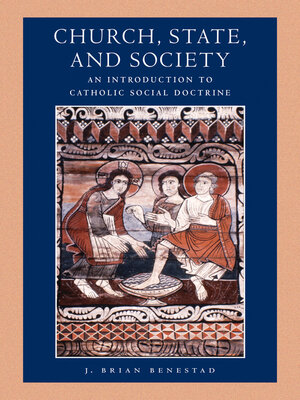Church, State, and Society
ebook ∣ An Introduction to Catholic Social Doctrine · Catholic Moral Thought
By J. Brian Benestad

Sign up to save your library
With an OverDrive account, you can save your favorite libraries for at-a-glance information about availability. Find out more about OverDrive accounts.
Find this title in Libby, the library reading app by OverDrive.



Search for a digital library with this title
Title found at these libraries:
| Library Name | Distance |
|---|---|
| Loading... |
How can the Catholic faith help not only Catholics, but all people, build a just and flourishing society? The Catholic Church contributes first and foremost to the common good by forming the consciences of the faithful. Faith helps reason achieve an understanding of the common good and guides individuals in living justly and harmoniously. In this book, J. Brian Benestad provides a detailed, accessible introduction to Catholic social doctrine (CSD), the Church's teachings on the human person, the family, society, political life, charity, justice, and social justice. Church, State, and Society explains the nuanced understanding of human dignity and the common good found in the Catholic intellectual tradition. It makes the case that liberal-arts education is an essential part of the common good because it helps people understand their dignity and all that justice requires. The author shows the influence of ancient and modern political philosophy and examines St. Augustine, St. Thomas Aquinas, papal social encyclicals, Vatican Council II, and postconciliar magisterial teaching. Benestad highlights the teachings of popes John Paul II and Benedict XVI that the attainment of the common good depends on the practice of the virtues by citizens and leaders alike. In addition to discussing the tension between CSD and liberal democracy, the book takes an in-depth look at: –Key themes of social life: the dignity of the human person, human rights, natural law, and the common good –Three principal mediating institutions of civil society: family, Church, and Catholic university –The economy, work, poverty, immigration, and the environment –The international community and just war principles "Excellent . . . The best treatment of Catholic Social Doctrine as a whole and a precious reminder of the intrinsically problematic character of modern democracy." —Perspectives on Political Science







